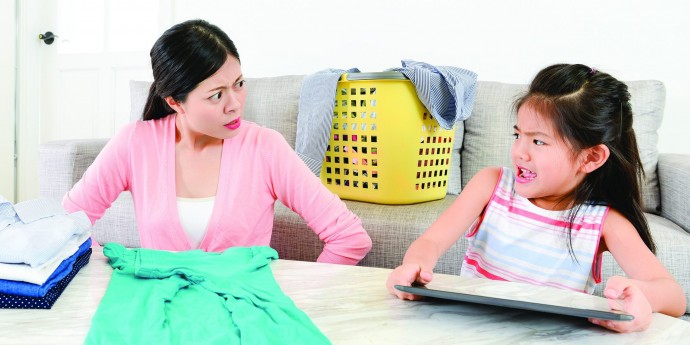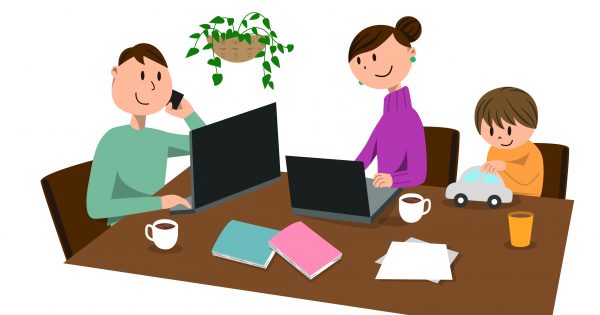Staying calm is an essential yet challenging skill that parents should learn, but don’t be too hard on yourself if you do lose your temper. Accept your own shortcomings first before finding ways to regulate your emotions. Having too much internal conflict can take your attention away from connecting with your child.
Keeping a lid on things
Do your best to cope with anger and learn your main triggers. It’s easy to yell when you lose your cool. Your tone speaks volumes – a harsh tone and/or language can worsen the situation. However, yelling is useful to quickly get attention, especially in urgent situations (e.g. you may shout “STOP THAT!” followed by a stern warning not to play with the kitchen knife).
Use a firm and commanding tone – do not scream at your kids in anger or frustration as this aggravates their emotions. He may think that you don’t love him anymore, which may lower his self- esteem, or increasing the risk of him modelling after you, or developing aggressive or disruptive behaviours.
Be the model
It is important that you be the model for how you want your child to grow up. So if you prefer manageable emotions in him, you need to be that model for management. As such, any mistake on your part should be pointed out along with a better model as the replacement for that mistake. This will help him to differentiate the preferred behaviours from the less appropriate ones.
If you do yell at your child, try to apologise to him when you realise that it might have contributed to more problems (e.g. your child crying, leading to further disruptions). When you have calmed down, let him know you were inappropriate in shouting and that you are sorry.This helps him understand that what you did was unacceptable and that it would be better to find more constructive ways of dealing with problems.
Defusing your anger
Calmness is being free of agitation or strong emotions, so find constructive ways to manage stress and frustration. It’s easier to prevent anger from building up rather than controlling it later. While breathing techniques prevent anger from escalating (it works by helping your body calm itself), it’s less effective after you’ve lost your temper.
Take short pauses between breaths repeatedly to lower your heart rate and promote calmness. Imagine a cool refreshing energy flowing in with each breath and anger/ frustration flowing out when exhaling. Constant practice will help you become more proficient at calming yourself.
While your child’s actions or reactions are not under your direct control, how you respond is. Deal with your temper first before dealing with him. There are three steps you can use:
- Pay attention: learn to recognise triggers, patterns or habits that do not help and address them. Don’t blame yourself whenever you fail – you will eventually realise what sets you off!
- Hit pause: recognise your emotions. Before losing your temper, drop whatever you are doing and take steps to calm yourself down. Remind yourself this is also an opportunity to teach your child to manage his emotions.
- Give each other space: take a short breather to give everyone time to calm down. Deal with the issue when tempers have cooled. Give him a chance to speak his piece if he is also calm.
Try your best to be your child’s role model for keeping your cool – children have a natural tendency to emulate their parents.
Other points to ponder
Managing your child’s behaviour is not about winning. If you think it is a competition, you have already lost. What’s more important is to focus on the learning objective of what you are trying to achieve with your child. Take a stand on important issues (e.g. finishing their homework on time) but let the small stuff slide for the time being (e.g. leaving cluttered footwear at the door) otherwise, you may end up wasting time and energy over less important things, which may take attention away from the more important bits.
A child’s bad behaviours are not personal attacks directed at you – they are due to the lack of skills in managing challenges around them. Your child is still unable to handle himself in a mature manner, especially when he does not get his way. Empathising with him and directing him toward empowerment in addressing problems will go a long way towards defusing potentially explosive situations.
Take care of yourself

Good physical health makes it easier to stay positive. So eat healthily and get enough physical activity. Sufficient rest and sleep can be challenging, but grab as much as you can – being well-rested will improve your tolerance level and buffer you against stress.
Taking care of the family can wear you out, so don’t neglect yourself. Include “me time” in your schedule to do simple things you enjoy – gardening, listening to music, a quiet meal, etc.
Talk to a professional if you have difficulties managing your anger. Frequently losing one’s temper, accompanied by outbursts, can be a symptom of functional depression, especially in people who are normally patient. Don’t be afraid to seek help in addressing the issues that you face. It is much better (and cheaper) to address emotional problems early, before they get any worse.







Comments